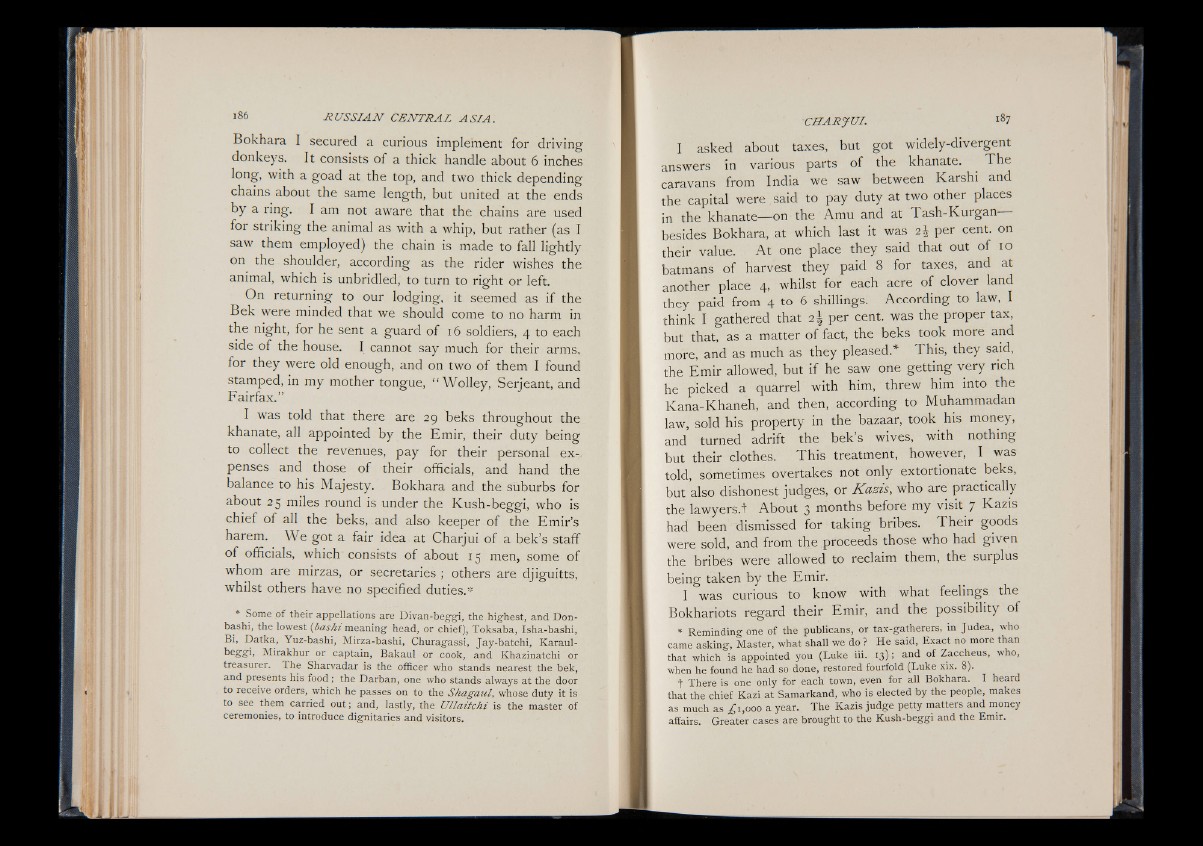
Bokhara I secured a curious implement for driving
donkeys. It consists of a thick handle about 6 inches
long, with a goad at the top, and two thick depending
chains about the same length, but united at the ends
by a ring. I am not aware that the chains are used
for striking the animal as with a whip, but rather (as I
saw them employed) the chain is made to fall lightly
on the shoulder, according as the rider wishes the
animal, which is unbridled, to turn to right or left.
On returning to our lodging, it seemed as if the
Bek were minded that we should come to no harm in
the night, for he sent a guard of 16 soldiers, 4 to each
side of the house. I cannot say much for their arms,
for they were old enough, and on two of them I found
stamped, in my mother tongue, 1 Wolley, Serjeant, and
Fairfax.”
I was told that there are 29 Beks throughout the
khanate, all appointed by the Emir, their duty being
to collect the revenues, pay for their personal ex-/
penses and those o f their officials, and hand the
balance to his Majesty. Bokhara and the suburbs for
about 25 miles round is under the Kush-beggi, who is
chief of all the beks, and also keeper of the Emir’s
harem. We got a fair idea at Charjui of a bek’s staff
of officials, which consists of about 15 men, some of
whom are mirzas, or secretaries ; others are djiguitts,
whilst others have no specified duties.*
* Some of their appellations are Divan-beggi, the highest, and Don-
bashi, the lowest (basht meaning head, or chief), Toksaba, Isha-bashi,
Bi, Datka, Yuz-bashi, Mirza-bashi, Churagassi, Jay-batchi, Karaul-
bef>f>b Mirakhur or captain, Bakaul or cook, and Khazinatchi or
treasurer. The Sharvadar is the officer who stands nearest the bek,
and presents his food ; the Darban, one who stands always at the door
to receive orders, which he passes on to the Shagaul, whose duty it is
to see them carried out; and, lastly, the Ullaitchi is the master of
ceremonies, to introduce dignitaries and visitors.
I asked about taxes, but got widely-divergent
answers in various parts of the khanate. ^ The
caravans from India we saw between Karshi and
the capital were said to pay duty at two other places
in the khanate— on the Amu and at Tash-Kurgan
besides Bokhara, at which last it was 2J per cent, on
their value. A t one place they said that out of 10
batmans of harvest they paid 8 for taxes, and at
another place 4, whilst for each acre of clover land
they paid from 4 to 6 shillings. According to law, I
think I gathered that 2\ per cent, was the proper tax,
but that, as a matter of fact, the beks took more and
more, and as much as they pleased.* This, they said,
the Emir allowed, but if he saw one getting very rich
he picked a quarrel with him, threw him into the
Kana-Khaneh, and then, according to Muhammadan
law, sold his property in the bazaar, took his money,
and turned adrift the bek’s wives, with nothing
but their clothes. This treatment, however, I was
told, sometimes overtakes not only extortionate beks,
but also dishonest judges, or Kazis, who are practically
the lawyers.t About 3 months before my visit 7 Kazis
had been dismissed for taking bribes. Their goods
were sold, and from the proceeds those who had given
the bribes were allowed to reclaim them, the surplus
being taken by the Emir.
I was curious to know with what feelings the
Bokhariots regard their Emir, and the possibility of
* Reminding one of the publicans, or tax-gatherers, in Judea, who
came asking, Master, what shall we do ? He said, Exact no more than
that which is appointed you (Luke iii. 13); and of Zaccheus, who,
when he found he had so done, restored fourfold (Luke xix. 8).
t There is one only for each town, even for all Bokhara. I heard
that the chief Kazi at Samarkand, who is elected by the people, makes
as much as £ 1,000 a year. The Kazis judge petty matters and money
affairs. Greater cases are brought to the Kush-beggi and the Emir.